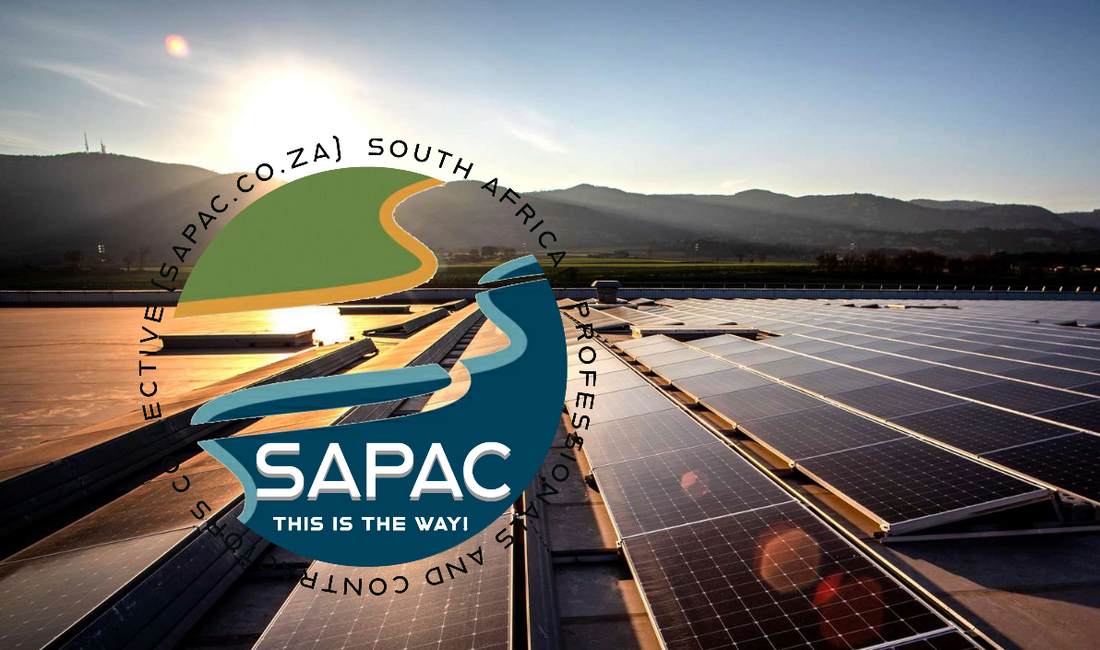
Factual information on Solar PV Installations
SAPAC ReporterShare
Factual information on Solar PV installations
Prepared by : SAPAC Reporter
Article Classification: Information
Image courtesy: SAPAC
Get in contact with SAPAC:![]() Besoek | Visit https://sapac.co.za/
Besoek | Visit https://sapac.co.za/
📑 Complete Form: Link (PRESS HERE) FOR SAPAC
[GOEIE INFORMASIE] SLUIT AAN! https://bit.ly/JoinSAPAC
Areas: Southern Africa, Northern Cape, Western Cape, Cape Winelands, Free State, Gauteng, North West Province, Limpopo, Mpumalanga, Natal
Did you know that with SAPAC there are trusted firms, that complies with regards to requirements. To get in contact complete the form above. Further down in the article is much more information for you.
Introduction
In the quest for a sustainable and cost-effective energy solution, many South Africans are considering the installation of Solar PV systems. However, it's vital to make well-informed decisions and prioritize safety. This SHORT CONCISE comprehensive guide provides crucial details and facts to empower consumers in choosing the right Solar PV Installer. Remember, while this article offers valuable insights, always consult with subject matter experts for your specific needs. We've also included information on contacting SAPAC (South African Professionals and Contractors) to assist you correctly.
Understanding Solar PV Systems
Whether you're planning to install a solar management system for your home or business or you already have one but face issues, this article is a must-read. It aims to inform and empower you. If you're uncertain about any aspect, don't hesitate to reach out to SAPAC for guidance.
What is an Electrical COC?
A Certificate of Compliance (COC) is a critical document accepted only in printed form. There's no electronic version. It carries a unique traceable identifier and is issued by the Department of Labor. An Electrical COC is legally required for all properties, residential or commercial, and is mandatory for new dwellings. It's valid for two years for property transfers, and ownership changes are not allowed if the COC is older than two years. The COC remains valid for the lifetime of the installation unless alterations are made, requiring a supplementary COC. Keep your Electrical COC safe, as insurance companies may request it in case of a claim.
Who Can Legally Install Solar Panels and Inverters?
In South Africa, unregistered individuals with legally registered companies are illegally installing solar management systems. They often use social media and low-cost solutions to attract customers. Only registered electricians are legally authorized to install these systems. Beware of misleading claims by unqualified installers and sensationalist news agencies. It's your responsibility to share this vital information with friends, family, and colleagues to protect them from misinformation.
Types of Electricians
South Africa recognizes three classes of electricians: ESTP Electricians, Installation Electricians, and Master Installation Electricians.
-
ESTP Electricians: These single-phase electricians with registered businesses can install solar management systems but cannot issue Electrical COCs. They must work under the control of an Installation or Master Installation Electrician, who will provide the valid COC. Further the electrician must be employed by them and may not subcontract under them.
-
IE Electricians (Installation Electricians) and MIE Electricians (Master Installation Electricians): These registered professionals can install solar management systems and issue Electrical COCs.
Regardless of the electrician you choose, prioritize professional after-market customer support. Solar components often come with warranties and guarantees, making post-installation support crucial. Avoid making selections solely based on social media recommendations.
SAPAC - Your only Guide to Reliable Electrical Contractors
SAPAC plays a vital role in helping the public choose trustworthy electrical contractors. SAPAC's mission is to provide information for informed decision-making.
It recognizes commercial risks and offers unique commercial solutions for the Construction and Mining trades. SAPAC offers a legal recourse platform to assist the public in case of issues and provides a means to report scams and legal concerns. Seek free, actionable information from SAPAC, a self-regulating industry recognized organization dedicated to promoting awareness and transparency.
Installing Solar Panels and Asbestos Roofing
Compliant electricians avoid installing solar panels on asbestos roofing due to the inherent health risk associated with asbestos fibers. The Department of Labour has issued a letter (dated 09/11/2022) supporting this stance. Do not be told that Solar panels may be installed on asbestos roofing.
Where Must a Solar System Be Installed Legally?
As per SANS 10400 T regulations, a solar management system in a dwelling must be installed on a firewall, typically a protruding wall. Commercial properties have different requirements also outlined in SANS 10400 T. Pay attention to installation locations for safety and compliance.
What Sets Electricians on SAPAC Apart
Electricians are recognised as one the major backbones of the South African industry. SAPAC Electricians understand the importance of open access to subject matter experts and the risks associated with social media. SAPAC prioritizes quality and quantifiable results, ensuring a safer and more reliable experience for both customers and electrical contractors. SAPAC also for legal, or installation queries have the Electrical Approved Inspection Authority on the SAPAC panel.
SAPAC serves as your guide to making your own informed decisions about Electricians that are legally allowed to install Solar PV systems in South Africa. Prioritize safety, consult with SAPAC obtain registered electricians, and reach out to SAPAC for guidance.
